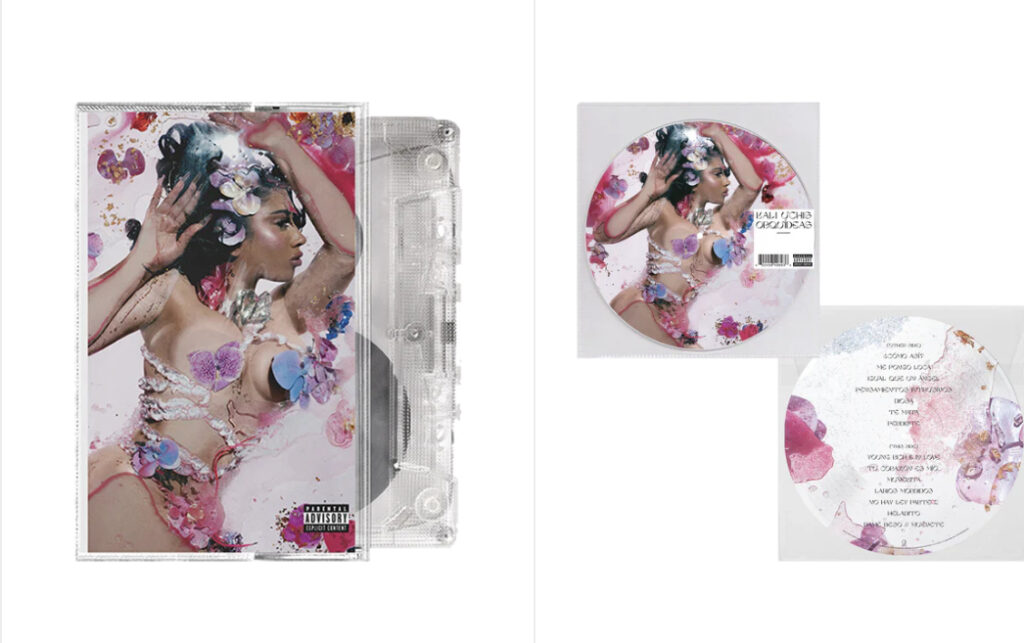Kali Uchis has never followed a linear path. She floats between genres, cultures, and languages with the grace of an artist fully aware of her multidimensional power. With Orquídeas, her fourth studio album and second full-length Spanish-language project, the GRAMMY® award-winning singer-songwriter returns to her roots with a body of work that is as lush and layered as the flower it’s named after: Colombia’s national orchid.
After the success of her bilingual albums—especially Sin Miedo (del Amor y Otros Demonios) ∞—Uchis has embraced the opportunity to dive deeper into her heritage. Orquídeas is not just a sonic expansion but a spiritual return, honoring both her cultural lineage and her evolution as a modern pop visionary. The album, now available in a limited-edition crystal clear cassette, is more than a nod to nostalgia—it’s a collectible emblem of her transformative artistry.
A Botanical Metaphor in Full Bloom
The title Orquídeas is more than poetic—it’s symbolic. The orchid, a national emblem of Colombia, represents beauty, sensuality, strength, and mystery. Uchis uses this imagery to great effect throughout the album, with songs that feel as vivid and intimate as petals unfurling. Like the orchid, each track seems meticulously cultivated—offering intoxicating scents of reggaeton, the bite of dembow, the sway of bolero, and the richness of salsa.
“I chose the orchid because it represents the duality of softness and resilience,” Uchis said in a recent interview. “That’s how I feel about my identity and my music. This album is a reflection of the parts of me that are rooted in Colombia—my sensuality, my spirituality, my strength.”
A Genre-Crossing Soundscape
Orquídeas is an ambitious mosaic of Latin styles, but rather than coming off as scattered or trend-driven, the album feels cohesive—each genre acting as a brushstroke in a singular self-portrait. Uchis doesn’t just borrow from these sounds; she inhabits them.
The opening track sets the tone with lush orchestration and an ethereal vocal arrangement that melts into a contemporary reggaeton rhythm. From there, Uchis seamlessly transitions into dembow-heavy cuts with modern flair—embracing the energy of perreo while still keeping her signature elegance intact.
Elsewhere, tracks nod to the romanticism of classic boleros. On one standout ballad, she sings with vintage glamour, her voice echoing with longing and pride. A salsa-infused number midway through the album acts as both a danceable interlude and a homage to her family’s musical legacy. Whether collaborating with modern Latin hitmakers or going solo, Uchis moves with purpose—each choice steeped in intention, not imitation.
Lyrics of Intimacy, Power, and Reclamation
As always, Kali Uchis excels lyrically when she taps into themes of love, sensuality, power, and emotional self-sufficiency. On Orquídeas, those themes find renewed strength in the Spanish language.
Across the album, Uchis delivers lines that mix vulnerability with authority. Her Spanish lyrics often carry a softness on the surface, but are underlined with razor-sharp confidence. Whether she’s crooning about love lost or asserting her independence, there’s a poetic duality that matches the album’s floral namesake.
Many songs feel like personal letters—written to lovers, ancestors, or her own past self. In one haunting track, she channels the voice of a woman scorned but not broken. In another, she celebrates her own self-worth with declarations that sound like affirmations delivered through melody.
Embracing the Visual and Physical
True to form, Uchis has built an aesthetic world around Orquídeas that extends beyond the music. The album’s visual campaign is steeped in floral motifs, celestial tones, and old-world Latin glamour. Uchis appears as a sort of botanical goddess—her styling merging retro-futurism with natural beauty. The visualizer for the lead single alone is a cinematic dream: velvet petals, chrome vines, and glittering tears set against a golden dusk.
And then there’s the crystal clear cassette—a tactile tribute to a time when music was held in hand, rewound, and cherished. This collector’s edition isn’t just a nod to retro formats; it reinforces the album’s core themes: clarity, fragility, and physical connection. In an age of algorithmic consumption, Uchis invites fans to experience Orquídeas in full—start to finish, tangible and timeless.
A Global Statement, Rooted in the Personal
Though deeply personal and specific to Uchis’s own experience, Orquídeas speaks to a larger movement in contemporary Latin music—one that values cultural authenticity over commercial conformity. As Latin pop continues to dominate global charts, artists like Uchis are reminding the world that Latin identity isn’t monolithic. It’s diverse, multilingual, and deeply textured.
By centering an album around Colombia’s national flower—and exploring sounds native to the country—Uchis is engaging in an act of cultural preservation through innovation. In doing so, she reclaims and reinterprets Latin womanhood on her own terms: complex, contradictory, and endlessly blooming.
Connection and Cohesion
While Orquídeas is undoubtedly Uchis’s vision, the album features several standout collaborations that enhance rather than distract. Her partners, ranging from rising reggaetoneros to legacy salsa musicians, contribute to the album’s organic tapestry.
But even in those moments, Uchis remains the central force. Her voice—silky, soulful, and controlled—is unmistakable. It glides over beats, wraps around harmonies, and asserts itself with unwavering poise. She doesn’t need to dominate to be felt. Her presence is constant, like sunlight in a tropical garden.
A Flower for Every Listener
With Orquídeas, Kali Uchis offers her fans something rare: an album that feels both expansive and intimate. Whether you’re a longtime listener or a new admirer, there’s something here for everyone—whether it’s the heat of a dembow rhythm, the ache of a bolero ballad, or the delicate poetry of her lyrics.
This album is more than a musical project—it’s a statement of identity, growth, and love. It shows us that returning to your roots doesn’t mean going backward. For Uchis, it’s the opposite: she’s blooming into a future that’s deeply personal, culturally resonant, and beautifully her own.
No comments yet.








